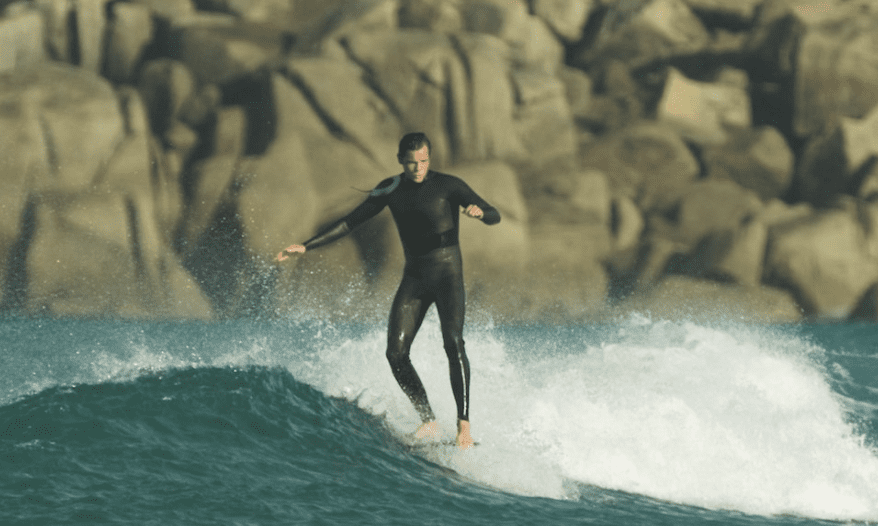Sam Bleakley is an award-winning British surfer, travel writer and video presenter, and one of our ambassadors for The Wave. He met up with us to talk about getting started in surfing, mindfulness, and the wonders of wetsuits. Here's our surfer interview.
What do you most love about surfing?
The sea, and just being in the water, was the biggest draw for me. I love the movement of the water, and that liquid environment that feels so impressive, alluring and changeable. Surfing allows you to make the sea safe; by getting into surfing, you start to develop a comfort within what is a potentially dangerous environment. That appealed to me when I was small, and gradually the sea became somewhere I felt comfortable.
How did you start?
I grew up in Cornwall and my dad, who was a surfer, taught me. I started at five, and by the time I was nine it was a big part of my life. He built up my confidence slowly, starting in gentle conditions with waist-high waves, and then encouraging me to challenge myself and develop bit by bit. Once I had gained my confidence, I could begin to enjoy myself in slightly wilder settings.
I think this is a really good approach. Wave pools can help with it because they're a controlled and safe environment where you can progress at your own pace, in small stages.
Who and what inspired you?
My dad, and a Californian surfer called Joel Tudor. He was a young longboard surfer at the forefront of the longboard revival of the late-1980s and early-1990s. He came to surf in Newquay in Cornwall in the early 90s, and my dad and I went to see him. It was a huge boost to see how it was done, and I went home inspired to try all the moves I'd seen him do.
What are the biggest barriers to progressing as a surfer?
Beginning is probably easier than most people think because the equipment for beginners is specially adapted to be safe, to float you and to be easy to use. That's why it's really important for any new surfer to use the right board and clothing, and to have solid, positive and sensible advice about equipment as they get more experienced.
Also, you might not progress as quickly as you'd like because the sea conditions aren't always as you'd like them to be; it's not like skiing, which has relatively fixed and predictable courses.
The Wave's consistent wave generation is going to be great for changing that experience.
What has it taught you about life?
First, it taught me about interacting with the environment – things like learning to read weather charts, understanding tides, recognising polluted water and spotting washed-up plastics.
But it also helps you to understand how you deal with your own limitations – surfers can get frustrated and angry when the sea changes and things don't go their way, so you learn to accept that you might not always progress as quickly as you might want to. That's really good for your understanding of yourself.
What has it taught you about your body?
The joy of feeling locked into a wave when you're moving at the same pace as the wave and you feel as if you're a part of it. At moments like that you can feel a zen-like flow-state, and time stands still; the experience can be quite fleeting, so you want to keep coming back for more.
Does it de-stress you, and if so how and why?
Surfing massively helps with mindfulness, and being fully 'in the moment'. You can't think about other things when you're in the water surrounded by waves, so I feel very relaxed when I'm surfing. It feels like a place where I have a clean slate, and am only focused on the present.
What are the greatest myths or misconceptions about surfing?
That it's inaccessible, macho and all about big waves. Most surfing around the world happens in very safe conditions, with lots of people happy to just ride in waist-high waves.
There's also the myth that surfing is full of gorgeous young people. It actually attracts a broad spectrum of ages, and people of all shapes and sizes. Nobody cares what you look like, or what you're wearing; they just want people to enjoy themselves.
Is it embarrassing to do if you’re a newbie and how should someone deal with that?
The two main embarrassment barriers are 'I'm not going to be good enough', and 'I'm too conscious of how I look to wear the clothing'. The first thing to say is, there will always be people there of different abilities and shapes and sizes, and the second, is that nobody cares what you look like or what you're wearing, they just want to see people enjoying themselves.
Remember, it's really easy to have fun even if you never rise to your feet and just lie on the board. And it's fine to do that. Also, one great thing about British surfing is that we wear wetsuits, which are tight fitting and keep everything in! Getting into a wetsuit can give you confidence if you're worried about your appearance because it hides a lot – but in reality nobody cares about all that!
What’s the best time you have surfing?
I really love it in the summer holidays. Summer-holiday surfing with my kids is my ideal time. In the UK the waves are actually better in winter, but I just love the summers in Cornwall when I'm down at the beach with the kids and there's a real family atmosphere because the waves are small and fun. That's my favourite time of year for sure.
